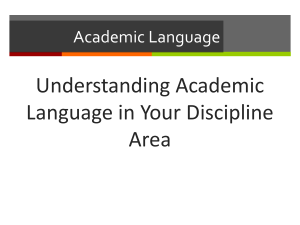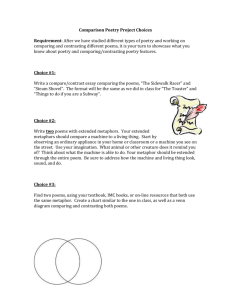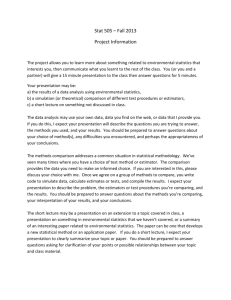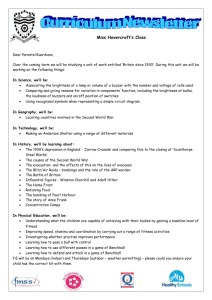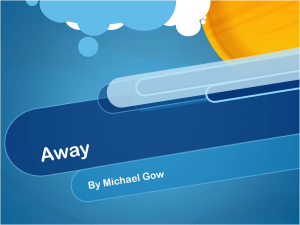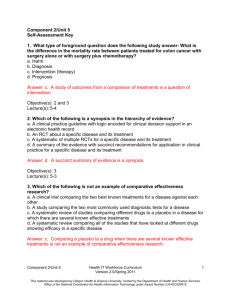english i syllabus - Point Pleasant Beach School District
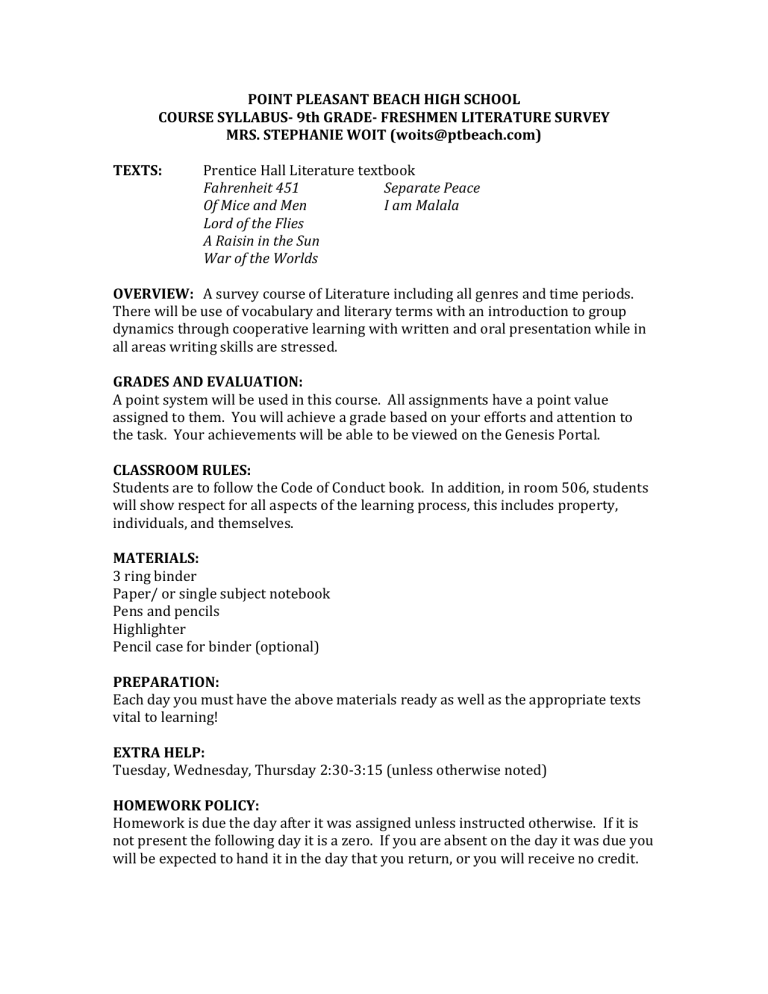
TEXTS:
POINT PLEASANT BEACH HIGH SCHOOL
COURSE SYLLABUS- 9th GRADE- FRESHMEN LITERATURE SURVEY
MRS. STEPHANIE WOIT (woits@ptbeach.com)
Prentice Hall Literature textbook
Fahrenheit 451
Of Mice and Men
Lord of the Flies
A Raisin in the Sun
War of the Worlds
Separate Peace
I am Malala
OVERVIEW: A survey course of Literature including all genres and time periods.
There will be use of vocabulary and literary terms with an introduction to group dynamics through cooperative learning with written and oral presentation while in all areas writing skills are stressed.
GRADES AND EVALUATION:
A point system will be used in this course. All assignments have a point value assigned to them. You will achieve a grade based on your efforts and attention to the task. Your achievements will be able to be viewed on the Genesis Portal.
CLASSROOM RULES:
Students are to follow the Code of Conduct book. In addition, in room 506, students will show respect for all aspects of the learning process, this includes property, individuals, and themselves.
MATERIALS:
3 ring binder
Paper/ or single subject notebook
Pens and pencils
Highlighter
Pencil case for binder (optional)
PREPARATION:
Each day you must have the above materials ready as well as the appropriate texts vital to learning!
EXTRA HELP:
Tuesday, Wednesday, Thursday 2:30-3:15 (unless otherwise noted)
HOMEWORK POLICY:
Homework is due the day after it was assigned unless instructed otherwise. If it is not present the following day it is a zero. If you are absent on the day it was due you will be expected to hand it in the day that you return, or you will receive no credit.
LAPTOP POLICY:
You are expected to be working on the task at hand at all times. Laptops will only be used for research in this course. They are to remain under your desk at all times. If needed you will be told.
ESSAYS:
All essays are due on the date the teacher assigns. The essays will be accepted for a maximum of four days after their due date, after that it is a zero. Each day prior to the 4 th day you will lose 10 points off the final grade of the paper.
ABSENCES:
It is your responsibility to make up missed assignments due to an absence. Get the missed work from the webpage, a friend, or the teacher. You need to make arrangements with the teacher for all missed tests and quizzes. District policy states that you have 10 days and then teachers do not have to assign credit. Please be prompt in your make up.
ATTENDANCE:
Attendance will be taken as you deposit your cell phone. Phones will be stored safely as you enter the room and picked up as you exit. This will ensure that you adhere to school policy as well as stay focused and attentive during class.
BATHROOM POLICY:
It is requested that you use the restroom and take water breaks before or after class.
If you are out of the class you are missing valuable information toward your success in this course. Emergencies are always excused.
PARENT CONTACT:
At any given time if you are in danger of failing the course I will contact your parents/guardians. I also frequently communicate with parents via the Genesis
Portal.
EMERGENCY PROCEDURES:
Explained by Mrs. Woit on day 1! Take them SERIOUSLY and follow instructions!
HEADING AND FORMAT:
Everything that you submit for a grade, including homework, must be typed. You should also use the proper format. The body of the assignment should be double spaced in an approved font, size 12 only. The proper heading, listed below, is to be used at all times.
Single Space the heading (top left corner)
NAME
DATE
ASSIGNMENT NAME
Mrs. Woit/ period letter or #
UNIT 1: Can Truth Change?
(Fiction and Non Fiction)
(September- October)
SYNOPSIS:
Truth can be defined as “the real state of things” or “agreement with fact or reality.”
Deciding what is truth and what is not can be a complicated matter. Often we accept as a truth or a fact at one time is later proven false when evidence shows the idea or belief is wrong. Does the truth and change, or does our understanding of the change? Can we ever know what is true? These are questions that writers explore in literature, and they invite you, the reader, to explore with them. (Prentice Hall)
Determining Themes in Fiction
Determining Central Ideas in Non-Fiction
Workshop:
from “I Stand Here Ironing”
from “The Giant’s House”
from “State of the Union Address”
“The Washwoman”
“Sonata for a Harp”
“The Cask of Amontillado”
“The Checkouts”
(pg. 568)
(pg. 470)
(pg. 5)
(pg. 236)
“The Secret Life of Walter Mitty” (pg. 299)
“Uncle Marcos”
“If I Forget The, Oh Earth”
(pg. 504)
(pg. 426)
from “Silent Spring”
Skills:
Making Predictions (Plot)
Comparing Point of View
Author’s Purpose/ Voice
Author’s Purpose/ Character
Comparing Themes
The Novel:
Writing Workshop:
(pg. 430)
Fahrenheit 451
Argument: Problem and Solution Essay
UNIT 2: Is Conflict Necessary?
(Short Stories)
(November-December)
SYNOPSIS:
A conflict is a struggle between opposing forces. A conflict might be as small as an argument between friends or as large as a war between nations. It might also involve just one person who faces a personal challenge or hard decision. Conflicts occur frequently in literature and life, but are they necessary? Conflicts can be difficult for the people involved in them, but can a conflict also have a positive outcome? (Prentice Hall)
Analyzing Character
Analyzing Structure and Theme
Elements of a Short Story
Workshop:
Old Man at the Bridge
The Jade Peony
“The Most Dangerous Game”
“The Gift of the Magi”
(pg. 16)
(pg. 459)
“The Interlopers” (pg. 262)
“The Man to Send Rain Clouds” (pg. 522)
“Old Man of the Temple”
“Rules of the Game”
“The Necklace”
(pg. 176)
(pg. 224)
(pg. 536”
“Blues Ain't No Mockin’ Bird”
“The Invalid’s Story”
(pg. 498)
(pg. 526)
“The Scarlet Ibis” (pg. 484)
“The Golden Kite, The Silver Wind” (pg. 152)
Skills:
Making Inferences/Conflict
Making Inferences/ Irony
Comparing Setting
Cause and Effect/ Characterization
Cause and Effect/Dialogue and Dialect
Comparing Symbolism and Allegory
The Novel:
Writing Workshop:
Separate Peace or Lord of the Flies
Explanatory Text: Cause and Effect Essay
UNIT 3: Is Knowledge the Same as Understanding?
(Types of Non Fiction)
(January)
SYNOPSIS:
We are constantly working to learn more about the world. We find information in a variety of sources, and we struggle to comprehend the facts. We may study books, interpret charts, and conduct further research. We may talk to others to gain insight. We may have gained knowledge, but when do we know that we truly understand? For example, does practicing soccer prepare us to play soccer? Does reading about relationships help us get along, or do we have to experience a friendship to truly understand? (Prentice Hall)
Elements of Essays, Articles, and Speeches
Analyzing the Development and Organization of Ideas
Analyzing Word Choice and Diction
Workshop:
“I Am an American Day Address”
“Speech to the Virginia Convention”
“Before Hip Hop was Hip Hop”
“A Celebration of Grandfathers” (pg. 576)
(pg. 572) “On Summer”
“Single Room, Earth View”
“The News”
(pg. 559)
(pg. 500)
(pg. 590)
from “A Lincoln Preface”
“Arthur Ashe Remembered”
“Carry your own Skis”
“Libraries Face a Sad Chapter”
“I Have a Dream”
“First Inaugural Address” FDR
“The Talk” (Humorous Essay)
Talk (Humorous Folk Tale)
(pg. 140)
Skills:
Main Idea/ Author’s Style
Main Idea / Expository Essay
Comparing Biographical Writing
Comparing Humorous Writing
The Drama:
Writing Workshop:
UNIT 4:
SYNOPSIS:
“Oedipus”
Argument: the Editorial
How Does Communication Change Us?
(Poetry)
(February)
Communication involves talking to other people and also listening to and learning from them. It takes place when you discuss an issue with a friend or react to a piece of writing. Communication is the understanding you get read a poem. It is empathy that you feel after listening to a news interview with victims of a natural disaster.
All of this communication may change us, but how? Does it make us smarter, wiser, kinder, angrier? Does it make us better people, or just more experienced? (Prentice
Hall)
Elements of Poetry
Analyzing Poetic Language
Workshop:
“Barter”
“We Grow Accustomed to the Dark”
“Uncoiling/ A Voice”
“Dream Deferred”
“Dreams”
“Meciendo/Rocking
“I Wandered Lonely as a Cloud”
“All Watched Over By Loving Grace”
“Hope is a Thing With Feathers”
“Summer”
“The Eagle”
“The Bells”
“Slam, Dunk, & Hook”
“JabberWocky”
(pg. 798)
(pg. 799)
(pg. 807) FIGURATIVE LANGUAGE
(pg. 789)
(pg. 413)
(pg. 797)
(pg. 815)
(pg. 796)
(pg. 818)
(pg. 198)
(pg. 352)
SOUND DEVICES
“Casey at Bat”
“Fifteen”
(pg. 36)
(pg. 241) NARRATIVE POETRY
“The Raven”
“The Horses”
“The Road Not Taken”
“We Never Know How High We Are”
(pg. 832)
(pg. 415)
(pg. 166)
(pg. 248)
“Maggie and Milly and Molly and May” (pg. 284) RHYME AND METER
“The Seven Ages of Man”
“Fire and Ice”
“Three Haiku
“Women”
“Sonnet”
Skills:
(pg. 836)
(pg. 412)
(pg. 844)
(pg. 283)
(pg. 843)
Read Fluently / Figurative Language
Read Fluently / Sound Devices
Narrative Poetry
Rhyme and Meter
Comparing Forms of Lyric Poetry
Writing Workshop: Argument: Response to Literature
UNIT 5: Do Our Differences Define Us?
(Drama)
(March/ April)
SYNOPSIS:
The differences among human beings can certainly be obvious, like hair color, height, or the accents that mark our speech. Other, more subtle differences may be noticed only when we get to know each other. These differences may show up in our values and in the mannerisms and traditions that are rooted in our individual culture. While our differences make us unique, they may also put us at odds with each other. Do our differences define who we are? (Prentice Hall)
Analyzing Character Development:
Workshop:
from “The Glass Menagerie”
from “The Shakespeare Stealer”
“The Tragedy of Romeo and Juliet”
ACT I (pg. 673)
ACT II
ACT III
ACT IV
(pg. 698)
(pg. 721)
(pg. 747)
ACT V
Skills:
(pg. 761)
Summarize Dialogue
Evaluating Sources
Comparing Satire
Comparing Archetypal Theme
Analyzing Text Information
The Novella:
The Drama:
Writing Workshop:
UNIT 6:
Of Mice and Men
“Raisin in the Sun”
Multi-Media Presentation of Research Report
Do Heroes Have Responsibilities?
(Themes in Literature)
(May/ June)
SYNOPSIS:
Heroes are all around us. We find them in literature and in the real world. Heroes sometimes show strength of character and an unusual depth of wisdom. They make important choices and selflessly get involved when others might stand back. Heroes may serve others or fight for justice. Often, they exhibit outstanding courage, honesty, and leadership, but sometimes they do not have any of these qualities, they can be ordinary, unassuming people who somehow stand up in a crisis and act in heroic ways. Think about who heroes are and what makes them take action. Is it character? Is it a sense of responsibility?
Determining Themes:
Analyzing Point of View and Cultural Experience:
Workshop:
from “The Ramayana”
from “The Carolina Way”
from “The Odyssey, Part 1) (pg. 860)
from “The Odyssey, Part 2)
“An Ancient Gesture”
(pg. 895)
(pg. 926)
“Siren Song”
“Ithaca”
“There is a Longing”
“Glory and Hope”
“The Red Headed League”
“Three Skeleton Key”
“Perseus”
“Pecos Bill: The Cyclone”
Skills:
The Epic Hero
(pg. 927)
(pg. 930)
(pg. 145)
(pg. 443)
(pg. 82)
(pg. 186)
Epic Simile
Comparing Contemporary Interpretations
Contrasting the Protagonist and the Antagonist
Comparing and Contrasting Philosophical Assumptions
Analyzing Primary Sources
The Novel:
Writing Workshop:
War of the Worlds / I am Malala
Comparison and Contrast Essay
THIS SYLLABUS IS ELABORATE. IT WILL BE AMENDED TO FIT THE YEAR AS
THE TEACHER SEES FIT.
